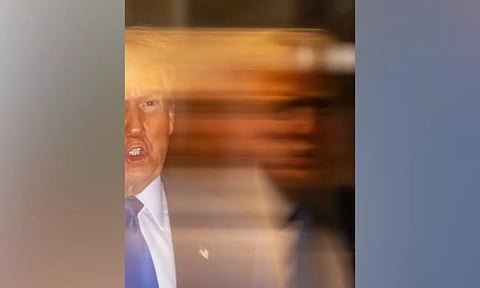

Curt Mills
UNITED STATES: Love it or hate it, the United States has an imperial presidency, and in his first term, Donald Trump demonstrated a record of using such powers with noted relish on the world stage. As in many areas, he does not have a conventional approach to global relations. But it may turn out that, like Richard Nixon and George H.W. Bush before him, Trump enjoys engagement with foreign policy.
His particular style of politics can be provocative, of course, but also effective. Trump’s approach to America’s place in the world is pragmatic or unpredictable or both, and it could offer surprising opportunities for peace. If Trump re-enters the Oval Office, he may seek to surprise in his final act, perhaps inspiring parallels, in its unpredictability and volatility, with Nixon and his “madman” foreign policy.
In Trump’s first term, his results in foreign affairs have generally been underrated. For a “madman,” there were real accomplishments: no new foreign wars, the Abraham Accords between Israel and a handful of Sunni states that many experts on the subject thought were impossible, a focus on China that is now bipartisan, putting allies on notice that they had to more than vaguely contribute to their own defense.
Unless the global landscape suddenly shifts, Trump would return to the Oval Office facing the sorts of foreign crises particularly the conflicts in Ukraine and the Middle East that he largely avoided in his first term. But the circumstances would surely not change the way he managed foreign affairs. In his first term Trump could be the bête noire of the establishment and Republican neoconservatives on Monday (as in his interactions with Kim Jong-un and the NATO leaders). And he could be the vicious spear tip of American power on Tuesday (as in the 2020 airstrike in Baghdad that killed Qassim Suleimani).
In a second term Trump would likely not assemble a right-wing establishment cabinet of oil executives and generals. He would instead be guided by a new group of establishment figures or pragmatists as well as a cut of advisers associated with the new right who want a broader convulsion in foreign policy and who wonder, with increasing despondence at the state of American culture, if a new Cold War-type enemy, perhaps China, would unify the population.
Members of this new right group increasingly disagree among themselves, particularly on just how far to take it to China and just how interchangeable conservative foreign policy should be with Israel’s. Among the new pragmatists, the man who succeeded John Bolton as national security adviser, Robert O’Brien, would almost certainly play a key role in a second term, perhaps as defense secretary or secretary of state.
O’Brien is an understated but powerful lawyer from the West Coast. (Another point in the Trump-Nixon echoes: In 2022, O’Brien was named chairman of the board of the Richard Nixon Foundation.) He calls himself a Reagan Republican and would be an easy Senate confirmation.
The team might also include the former acting director of national intelligence Richard Grenell, who was Trump’s ambassador to Germany from 2018 to 2020. An ally of O’Brien’s, Grenell engages in smashmouth interpersonal politics that marked his tumultuous tenure in Berlin. But his style aligns well with Trump’s approach to diplomacy-as-negotiation.
In addition to the wonkish ideologues and pragmatists, there is an unpredictable milieu of true believers, among them Steve Bannon and the retired colonel Douglas Macgregor, a cult hero on the new right who in the chaos of the 2020-21 transition was installed by Pentagon loyalists to Trump with the intent of a quick withdrawal from Afghanistan.
This team would suggest a vision relative aversion to ideology but a tolerance for radicalism that could fulfill Trump’s foreign policy approach, which favors a mixture of staying out of trouble and engaging in conflicts decisively and briefly. Washington veterans often react with puzzlement to the idea that Trump has a foreign policy vision at all. His approach confused people like Bolton, who criticized Trump for looking at “things on a transactional basis.”